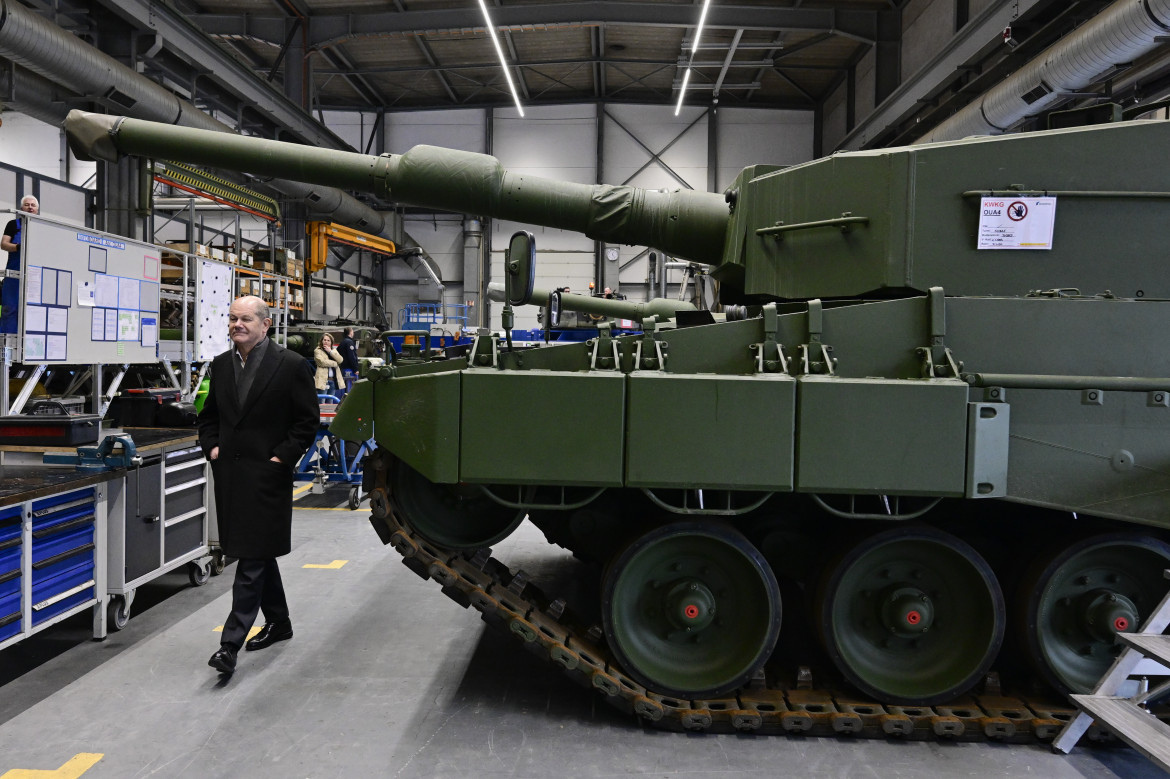Analysis
Germany ramps up arms production, with nuclear weapons on the table
Christian Lindner, the secretary of the FDP: ‘We cannot exclude that we will have to equip ourselves with our own nuclear bomb … Each country has to do its part for the common defense.'

Chancellor Olaf Scholz, always accused of stalling on any key decision and weighing every single word uttered in public, has clear ideas on Germany’s new vocation: war industry and atomic defense to protect not German social democracy, but “our Western values.” He is ready to pursue them at all costs, pushing through a multiple-billion-euro economic bill, on the back of a country already choked by recession, and bearing the electoral price that will be paid by his party, which has sunk to third place in the polls after the Christian Democrats and fascist-nationalists, only marginally ahead of the Greens.
Nevertheless, the turn towards war in Berlin is a done deal: “We need to have arms production at our plants working at full capacity. We must focus on the manufacture of all the ammunition needed,” Scholz stressed, outlining the two main goals: to continue to supply Ukraine’s increasingly shaky military capability with weapons and to prepare the Bundeswehr to become combat-ready by 2025 – the year in which the German Defense Minister envisions a “possible Russian attack on NATO.”
There will be no de-escalation, then. There is no major dissent within the SPD, only the slight grumbling of those who did not like the questionable timing of the announcement, close to the European elections. “Will fear bring us votes?” – that is the nagging doubt troubling some Social Democratic leaders; otherwise, they seem to have fully lined up behind the transformation of Germany into a giant trench protecting the “free world,” after Scholz outlined (for the first time explicitly) the new discourse on defending “Western values,” setting the immutable new track for the German “Locomotive.”
Nevertheless, from a strictly military standpoint, Europe’s leading economic power remains in such a derelict condition that one could hardly have imagined. The Financial Times have published images documenting the increasingly pitiful state of Germany’s armed forces, despite the colossal investment of €100 billion from the fund set up by Scholz. The Bundeswehr is “in many ways even less well equipped than it was before the Russian invasion of Ukraine,” because of the attrition war that first saw the moldy armored vehicles inherited from the DDR go to Kyiv, then the obsolete versions of Leopard-2 tanks, and finally demanded the few and expensive state-of-the-art systems vital to any army.
“It’s precisely for this reason that we must now accelerate the rearmament program,” commented SPD Defense Minister Boris Pistorius, as he had himself photographed on the hull of a tank at the Rheinmetall factory together with Chancellor Scholz. It’s looking a bit like a contest between leaders, or at least that must be how the Finance Minister, Christian Lindner, the secretary of the FDP, saw it, as he chose to one-up both of them, raising the security alert to the highest level of terror: “We cannot exclude that we will have to equip ourselves with our own nuclear bomb … Each country has to do its part for the common defense.” The FDP’s lead candidate in the European elections, Marie-Agnes Strack-Zimmermann, didn’t like his words – but only because she doesn’t think the nuclear umbrella should be discussed in public for security reasons.
However, the SPD’s lead candidate, Katarina Barley, agrees with Lindner on everything. She is convinced that there is a need to continue the more-or-less confidential talks with France aimed at sharing Macron’s atomic umbrella, especially now that Europe is at risk with the election of Trump in the US. In her view, statements on NATO are an invitation for us to set up a European atomic umbrella: “On the way to a European army, this could also become an issue.”
They’re also talking openly about nuclear bombs in neighboring Poland, where the generals just reiterated the need to transfer part of the nuclear deterrent to their air bases. The distance between Warsaw and Berlin is melting, as signaled by the resounding end of the chill in Polish-German diplomatic relations and the beginning of active cooperation, including in the military sphere, as evidenced by the plans being put forward by Scholz and Polish prime minister Donald Tusk.
Originally published at https://ilmanifesto.it/germania-verso-leconomia-di-guerra-lo-spettro-dellatomica-nel-dibattito on 2024-02-16
